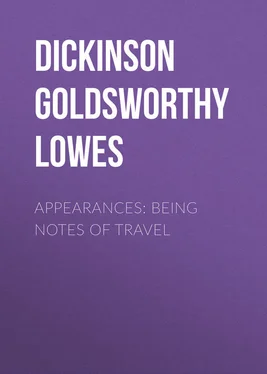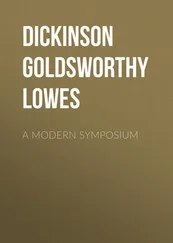Goldsworthy Dickinson - Appearances - Being Notes of Travel
Здесь есть возможность читать онлайн «Goldsworthy Dickinson - Appearances - Being Notes of Travel» — ознакомительный отрывок электронной книги совершенно бесплатно, а после прочтения отрывка купить полную версию. В некоторых случаях можно слушать аудио, скачать через торрент в формате fb2 и присутствует краткое содержание. Жанр: foreign_antique, foreign_prose, на английском языке. Описание произведения, (предисловие) а так же отзывы посетителей доступны на портале библиотеки ЛибКат.
- Название:Appearances: Being Notes of Travel
- Автор:
- Жанр:
- Год:неизвестен
- ISBN:нет данных
- Рейтинг книги:5 / 5. Голосов: 1
-
Избранное:Добавить в избранное
- Отзывы:
-
Ваша оценка:
- 100
- 1
- 2
- 3
- 4
- 5
Appearances: Being Notes of Travel: краткое содержание, описание и аннотация
Предлагаем к чтению аннотацию, описание, краткое содержание или предисловие (зависит от того, что написал сам автор книги «Appearances: Being Notes of Travel»). Если вы не нашли необходимую информацию о книге — напишите в комментариях, мы постараемся отыскать её.
Appearances: Being Notes of Travel — читать онлайн ознакомительный отрывок
Ниже представлен текст книги, разбитый по страницам. Система сохранения места последней прочитанной страницы, позволяет с удобством читать онлайн бесплатно книгу «Appearances: Being Notes of Travel», без необходимости каждый раз заново искать на чём Вы остановились. Поставьте закладку, и сможете в любой момент перейти на страницу, на которой закончили чтение.
Интервал:
Закладка:
G. Lowes Dickinson
Appearances: Being Notes of Travel
PREFACE
The articles included in this book have already appeared, those from the East in the Manchester Guardian , those from America in the English Review . In reprinting them, I have chosen a title which may serve also as an apology. What I offer is not Reality; but appearances to me. From such appearances perhaps, in time, Reality may be constructed. I claim only to make my contribution. I do so because the new contact between East and West is perhaps the most important fact of our age; and the problems of action and thought which it creates can only be solved as each civilisation tries to understand the others, and, by so doing, better to understand itself. These articles represent at any rate a good will to understand; and they may, I hope, for that reason throw one gleam of light on the darkness.
For the opportunity of travelling in the East I am indebted to the munificence of Mr. Albert Kahn of Paris, who has founded what are known in this country as the Albert Kahn Travelling Fellowships. 1 1 These Fellowships, each of the value of £660, were established to enable the persons appointed to them to travel round the world. The Trust is administered at the University of London, and full information regarding it can be obtained from the Principal, Sir Henry Miers, F.R.S., who is Honorary Secretary to the Trustees.
The existence of this endowment is perhaps not as widely known as it should be. And if this volume should be the occasion of leading others to take advantage of the founder's generosity it will not have been written in vain.
I have hesitated long before deciding to republish the letters on America. They were written in 1909, before the election of President Wilson, and all that led up to and is implied in that event. It was not, however, the fact that, so far, they are out of date, that caused me to hesitate. For they deal only incidentally with current politics, and whatever value they may have is as a commentary on phases of American civilisation which are of more than transitory significance. Much has happened in the United States during the last few years which is of great interest and importance. The conflict between democracy and plutocracy has become more conscious and more acute; there have been important developments in the labour movement; and capital has been so "harassed" by legislation that it may, for the moment, seem odd to capitalists to find America called "the paradise of Plutocracy." No doubt the American public has awakened to its situation since 1909. But such awakenings take a long time to transform the character of a civilisation and all that has occurred serves only to confirm the contention in the text that in the new world the same situation is arising that confronts the old one.
What made me hesitate was something more important than the date at which the letters were written. There is in them a note of exasperation which I would have wished to remove if I could. But I could not, without a complete rewriting, by which, even if it were possible to me, more would have been lost than gained. It is this note of exasperation which has induced me hitherto to keep the letters back, in spite of requests to the contrary from American friends and publishers. But the opportunity of adding them as a pendant to letters from the East, where they fall naturally into their place as a complement and a contrast, has finally overcome my scruples; the more so, as much that is said of America is as typical of all the West, as it is foreign to all the East. That this Western civilisation, against which I have so much to say, is nevertheless the civilisation in which I would choose to live, in which I believe, and about which all my hopes centre, I have endeavoured to make clear in the concluding essay. And my readers, I hope, if any of them persevere to the end, will feel that they have been listening, after all, to the voice of a friend, even if the friend be of that disagreeable kind called "candid."
PART I
INDIA
I
IN THE RED SEA
"But why do you do it?" said the Frenchman. From the saloon above came a sound of singing, and I recognised a well-known hymn. The sun was blazing on a foam-flecked sea; a range of islands lifted red rocks into the glare; the wind blew fresh; and, from above,
"Nothing in my hand I bring,
Simply to Thy cross I cling."
Male voices were singing; voices whose owners, beyond a doubt, had no idea of clinging to anything. Female voices, too, of clingers, perhaps, but hardly to a cross. "Why do you do it?" – I began to explain. "For the same reason that we play deck-quoits and shuffle-board; for the same reason that we dress for dinner. It's the system." "The system?" "Yes. What I call Anglicanism. It's a form of idealism. It consists in doing the proper thing." "But why should the proper thing be done?" "That question ought not to be asked. Anglicanism is an idealistic creed. It is anti-utilitarian and anti-rational. It does not ask questions; it has faith. The proper thing is the proper thing, and because it is the proper thing it is done." "At least," he said, "you do not pretend that this is religion?" "No. It has nothing to do with religion. But neither is it, as you too simply suppose, hypocrisy. Hypocrisy implies that you know what religion is, and counterfeit it. But these people do not know, and they are not counterfeiting. When they go to church they are not thinking of religion. They are thinking of the social system. The officers and civilians singing up there first learned to sing in the village church. They walked to the church from the great house; the great house stood in its park; the park was enclosed by the estate; and the estate was surrounded by other estates. The service in the village church stood for all that. And the service in the saloon stands for it still. At bottom, what that hymn means is not that these men are Christians, but that they are carrying England to India, to Burma, to China." "It is a funny thing," the Frenchman mused, "to carry to 300 million Hindus and Mahometans, and 400 million Confucians, Buddhists, and devil-worshippers. What do they do with it when they get there?" "They plant it down in little oases all over the country, and live in it. It is the shell that protects them in those oceans of impropriety. And from that shell they govern the world." "But how can they govern what they can't even see?" "They govern all the better. If once they could see, they would be lost. Doubt would enter in. And it is the virtue of the Englishman that he never doubts. That is what the system does for him."
At this moment a voice was borne down the breeze. It was that of my travelling companion, and it appeared, as he approached, that he was discoursing to the captain on the merits of Dostoievsky's novels. He is no respecter of persons; he imposes his own conversation; and the captain, though obviously puzzled, was polite. "Russians may be like that," he was remarking as he passed, "but Englishmen aren't." "No," said my friend, "but don't you wish they were?" "I do not ," said the captain with conviction. I looked at the Frenchman. "There," I said, "behold the system." "But your friend?" "Ah, but he, like myself, is a pariah. Have you not observed? They are quite polite. They have even a kind of respect – such as our public school boys have – for anyone who is queer, if only he is queer enough. But we don't "belong," and they know it. We are outside the system. At bottom we are dangerous, like foreigners. And they don't quite approve of our being let loose in India." "Besides, you talk to the Indians." "Yes, we talk to the Indians." "And that is contrary to the system?" "Yes, on board the boat; it's all very well while you're still in England." "A strange system – to perpetuate between rulers and ruled an impassable gulf!" "Yes. But, as Mr. Podsnap remarked, 'so it is.'"
Читать дальшеИнтервал:
Закладка:
Похожие книги на «Appearances: Being Notes of Travel»
Представляем Вашему вниманию похожие книги на «Appearances: Being Notes of Travel» списком для выбора. Мы отобрали схожую по названию и смыслу литературу в надежде предоставить читателям больше вариантов отыскать новые, интересные, ещё непрочитанные произведения.
Обсуждение, отзывы о книге «Appearances: Being Notes of Travel» и просто собственные мнения читателей. Оставьте ваши комментарии, напишите, что Вы думаете о произведении, его смысле или главных героях. Укажите что конкретно понравилось, а что нет, и почему Вы так считаете.












